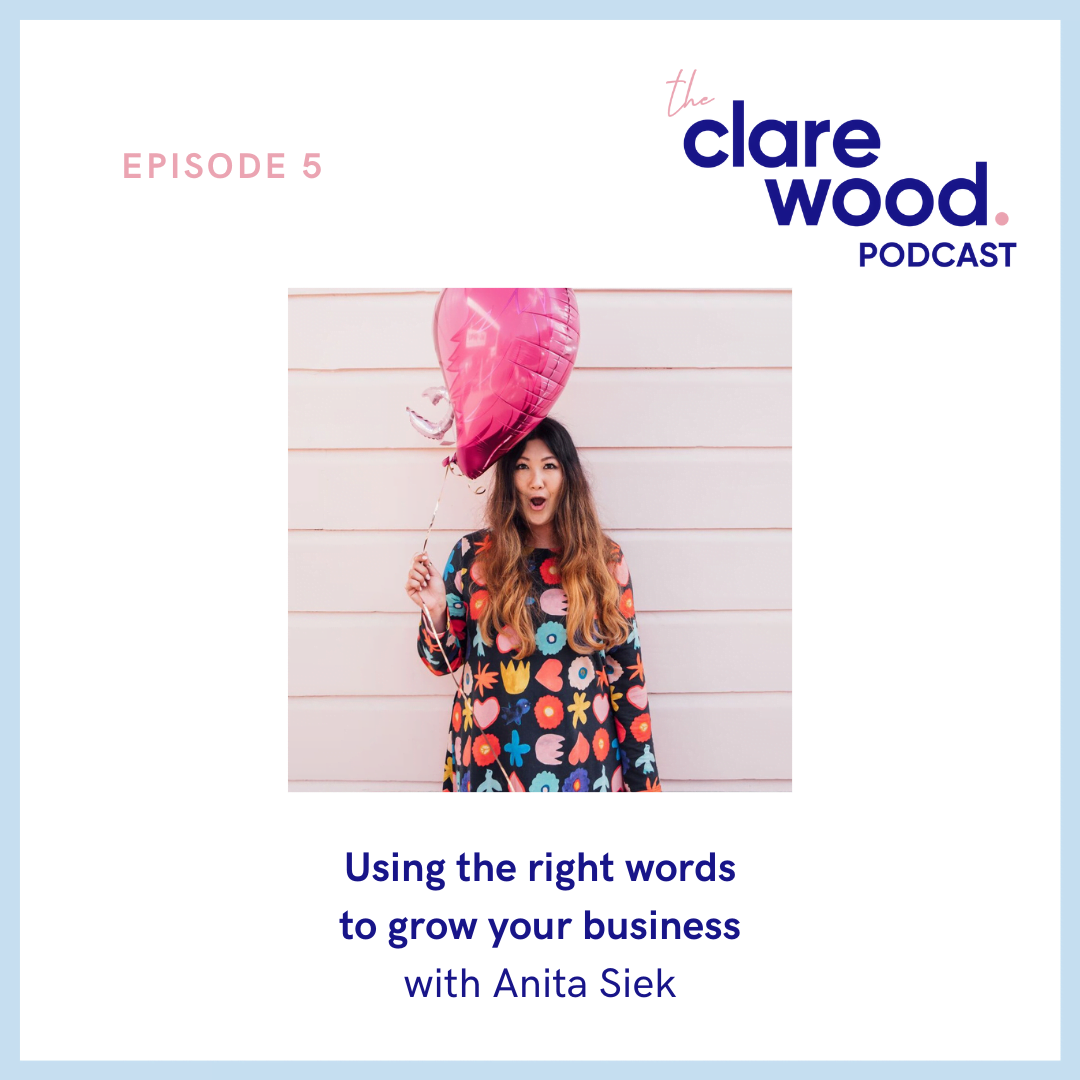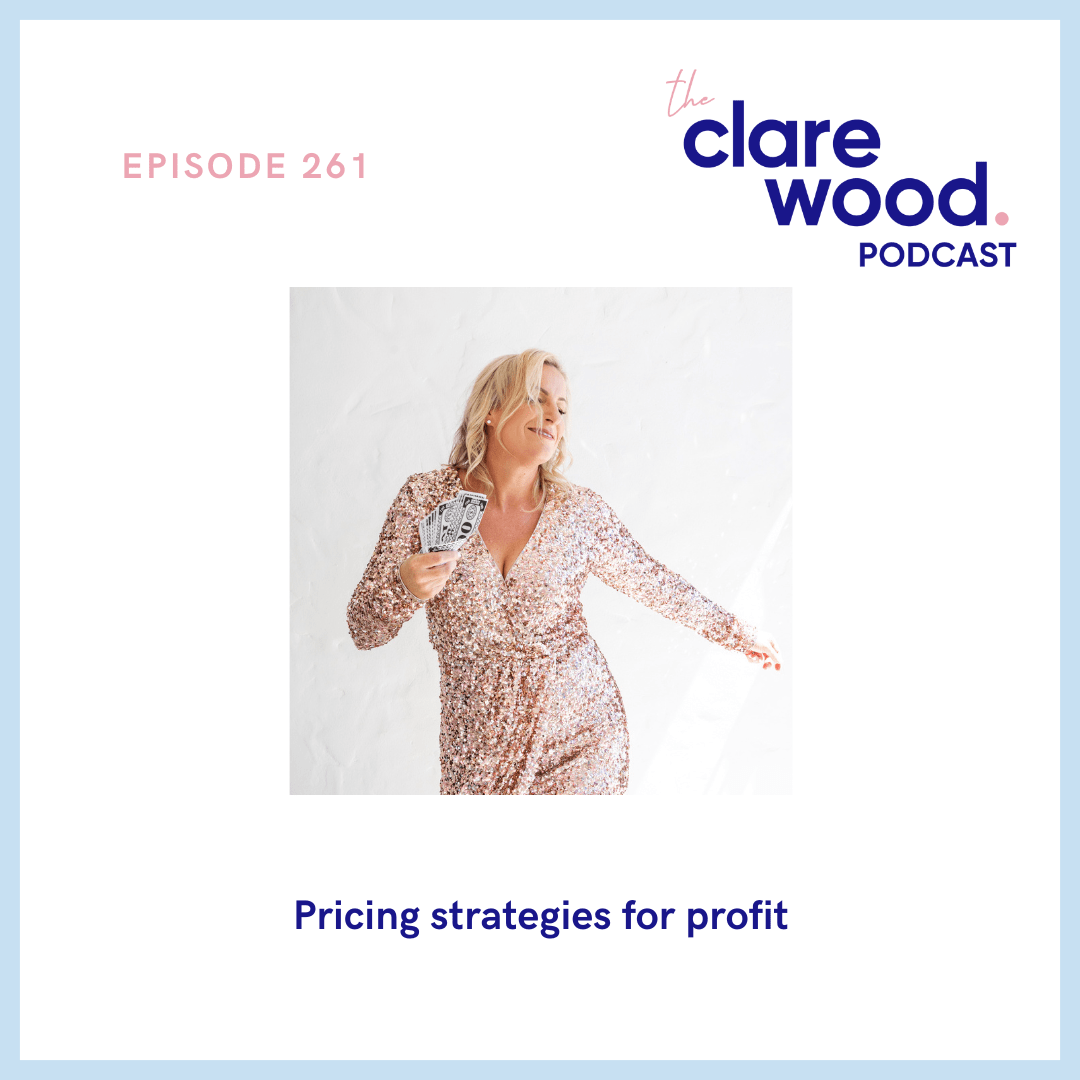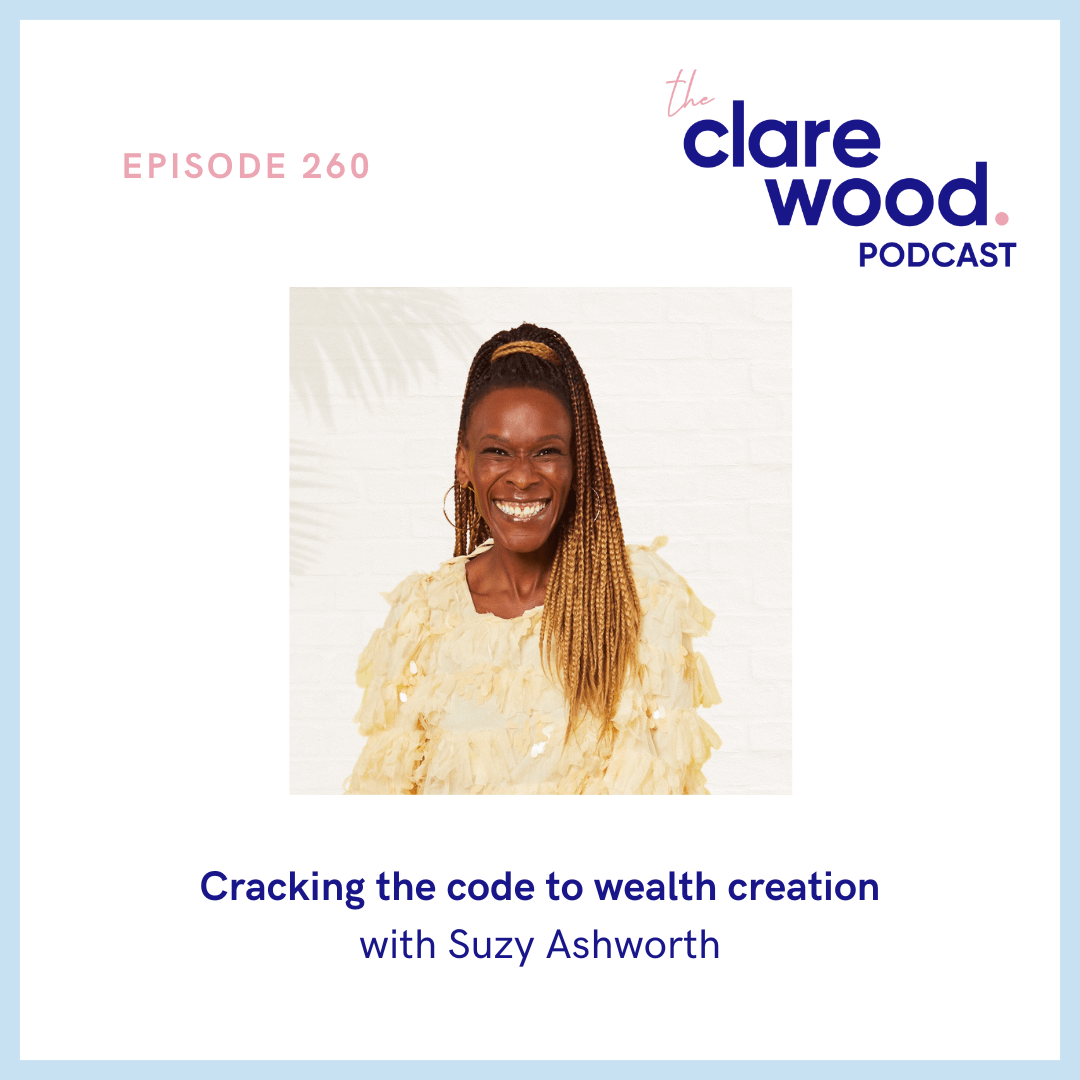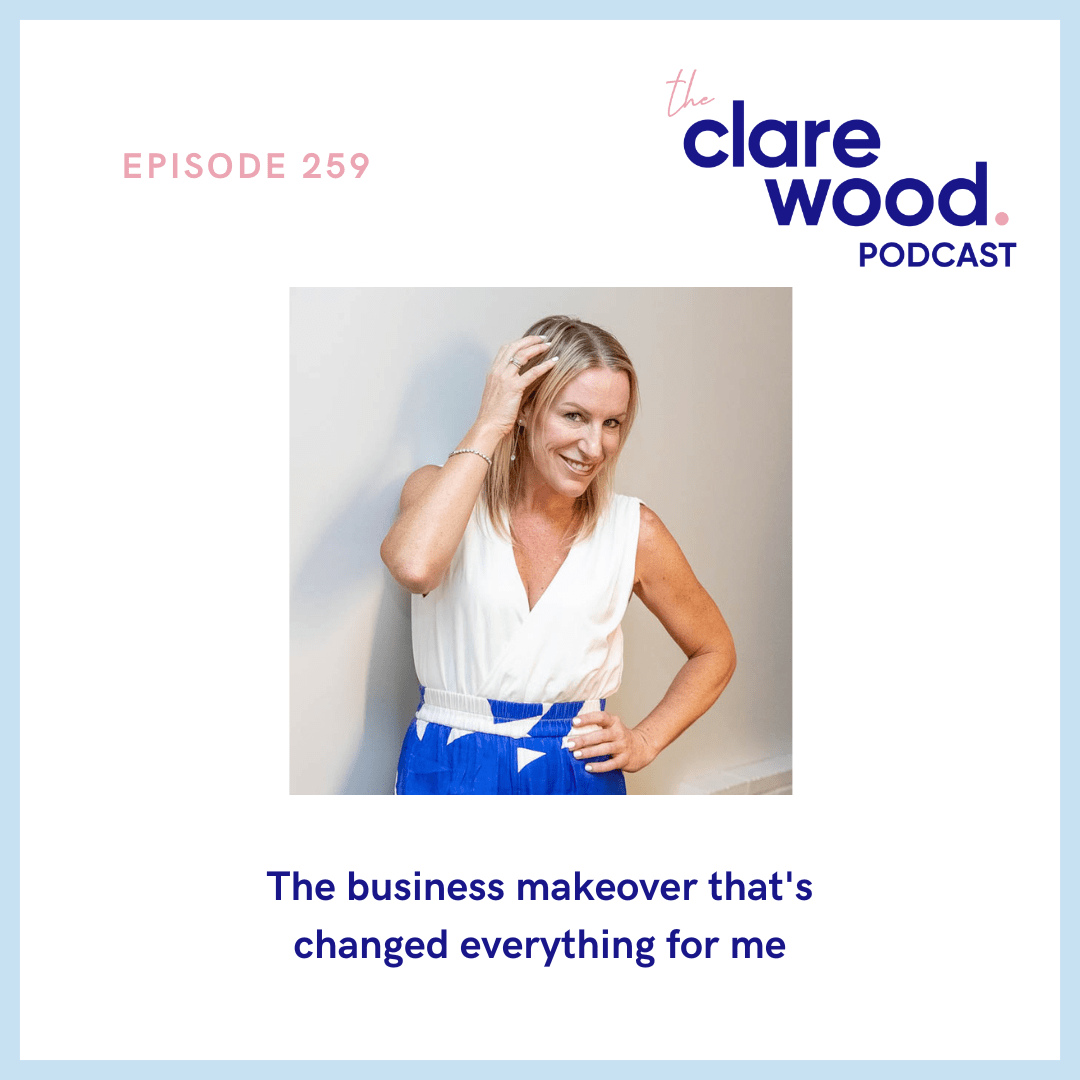The words that you use in your business can make or break how potential clients feel about your brand! It is SO important to use the right words in your copy. Today we learn from Anita Siek from Wordfetti about how working with a copywriter can transform the success of your business and your brand.
In this Episode:
03:10: What exactly does a copywriter do
6.06: Is using a copywriter to write for you misleading?
9:50: The biggest mistakes people make when writing their own copy
12:00: Why it’s worth investing in a copywriter
16:06: To what does Wordfetti attribute their success
21:04: The advice Anita would give to herself at the start of business
23:05: The toughest time Wordfetti has been through in business
Links:
CLARE WOOD SERVICES >
CLARE WOOD INSTAGRAM >
WORDFETTI WEBSITE >
WORDFETTI INSTAGRAM >
BRANDFETTI THE PODCAST – ITUNES >
BRANDFETTI THE PODCAST – SPOTIFY >
Anita Siek’s Bio
Anita Siek is an ex-lawyer turned copywriting and the the Founder and Director of Wordfetti – a strategic copywriting and communications studio specialising in helping brands stand out through the understanding of consumer psychology, strategic thinking, and words.
Things are done a bit differently at Wordfetti. It is not just about putting nice words and sentences together. It’s not just about grammar, or spelling, or writing for SEO. All of that is important. But copywriting to Wordfetti, is really so much more. It’s the combination of Art (being creative and original), Science (the understand of consumer psychology) and the articulation of a Brand’s Unique Sauce. It’s about really getting under the skin of a brand and a business and pooling together the purpose, the brand image (are you fun? serious? credible?), the vision, the unique selling proposition and the brand’s spirit into a story. A story that resonates. A story that is engaging. And a story that is powerful. Because after all, we are creatures of emotion, and we cannot deny that this is how we are all inherently wired.
Anita is also the host of Brandfetti: a no-fluff podcast dedicated to being in your ears every Wednesday with golden nugget value on content marketing and Copywriting, a glimpse behind the curtains on her personal business journey, and a peek at how some of our most loved brands have stood out in their industry through content.
Transcript
CLARE:
If you’re not a hundred percent sure what exactly a copywriter is, or what a copywriter does, well, stick around for today’s episode. I’m chatting with Anita from Wordfetti and she shares how a copywriter can grow your brand, the mistakes that she sees people making when it comes to copy, and some of her top advice for small business owners. Make sure you stick around.
You’re listening to the Clare Wood Podcast, where we talk all things business, finance, marketing and mindset for entrepreneurs, sharing practical tips, and actionable advice to help you take your business to the next level. Introducing your host: Me! I’m Clare Wood, I’m a numbers geek, a travel lover, and a reality tv addict, and I’m here to empower you to create an extraordinary business and an amazing life, because I believe you don’t have to chose between the two. Now let’s dive right in to today’s episode!
So, today I am super excited to have joining me the one and only Anita from Wordfetti!
ANITA:
Hello! I am so excited to be here!
CLARE:
Thank you so much for joining us! So, for anyone who lives under a rock and doesn’t know you and Wordfetti are, could you please do a quick intro to yourself?
ANITA:
Totally! Ok so, my name is Anita and I own Wordfetti, we are a copywriting studio that specializes in helping brands stand out through strategy; understanding the psychology of words.
We write words that stick, words that make people feel something, and words that trigger discussions, and, a bit about myself, I came from a very non-linear path to copywriting. I studied law and psychology in university, I went and did the traditional thing, got a corporate job, became a lawyer, and got what I thought was “ze dream job,” but then started Wordfetti as a side gig because for some reason the dream job was just not what I had thought and I started it as a creative outlet for me and honestly never thought that it would be a fulltime job, but then it ended up being a fulltime job.
I left my corporate job, now officially probably a year and a bit now, and yeah I told my mom probably only ten months, eleven months after that.
Love my mom but it was just one of those things where I knew she would be worried if I told her the stable government job to something that was unstable so, it’s out of pure love, mother.
CLARE:
So, anyone who’s listening and doesn’t actually know, what exactly does a copywriter do?
ANITA:
Yeah, you know what, so many people actually don’t know what a copywriter does. A lot of people think copywriters just simply write words that sound good, or think it’s about SEO, or ranking high with the Google gods, or if you’re my mother, you probably think it’s about writing poetry or haikus! I actually recently did an episode on the podcast Wordfetti on this but my own definition of what copywriting is, is it is a combination of art – which is the originality and creativity element, science -which is the understanding of consumer behaviour (why people buy from this brand as opposed to this other brand, even though they sell the exact same thing), as well as a brand’s unique sauce – I like to call it.
Everything that comes together pretty much to set that brand apart, and that is everything from the messaging, the tone of voice, the words they use to the visual elements as well. I personally see it as the cornerstone of effective online marketing, because it’s the glue. If you can get it right, the words can pretty much work as an online sales person that works for you day and night on your website. It has the ability to make you think differently, it has the ability to trigger conversations, it has the ability to get people acting and ultimately buying, so there is some statistics that say it is a fifty billion dollar industry, writing. I think the biggest misconception is that people think copywriters just produce the words, really, when you hire a copywriter, you’re actually hiring them for the journey it takes for them to get to those words; the journey, the decisions, the ideas, the strategy, the choosing one word over another and the Rubik’s Cubes that go behind those decisions, behind the copywriter’s brain to produce those words.
CLARE:
Wow! But you know in all seriousness, a lot of people don’t know what copywriting is. And you know, when I suggest to my clients, engaging a copywriter, they say, “What does that even do,” and in fact, some people say to me, “Isn’t that a bit fraudulent to be pretending that you’re writing something when it’s someone else?”
This leads me to my next question, which is, why do you think there is kind of this secret shame about using copywriters? And lots of people that I know too use copywriters too but don’t want to admit to it, so explain to me what that’s all about.
ANITA:
That’s a great question, I think to put it simply, it is very similar to what you mentioned, it’s very likely for the reason that you mentioned, because we are business owners ourselves, so shouldn’t we be the person – because we know everything about what we do – be the producer of our content, write our own content, write our own ideas, and write our own website, and write our own brochures? So, I think that is the stereotype, because we are the experts, so we should be the ones writing it. The thing is, the majority of the time, with the obviously the exception of you being an actual copywriter or a copywriting agency, you as the business owner, is the visionary. You are the visionary, you are the ideas generator, you have the concept, you have the knowledge, but that doesn’t necessarily make you a writer who can communicate all of that out to your audience in a way that is going to really resonate with them. I think sometimes too often, we are also so close to what we love, and I might actually take back just a little bit of what I said before – sometimes copywriters engage in other copywriters just to help them, because they’re just so close and, you know, it’s almost better to have someone become an extension of your brain, understand your business, and then communicate it in a way that will connect with your audience, because ultimately they are the people copywriters write for (the audience, not necessarily the client).
CLARE:
Excellent. Another thing on this: Look, you know, sticking my hand up, I’ve worked with a copywriter, I’ve worked with lots of different copywriters throughout my business, but it is always still me. It’s my concepts, it’s my tone of voice, and again, everything that comes out under my brand name is me, it’s all been reviewed by me, it’s all got my hand-writing across it. But a good copywriter can totally nail your tone of voice, there’s nothing misleading about it so long as that you’re not presenting something that is a totally fake perception of you, and I think that’s to me why it is super important to get the right copywriter. If someone has one experience of you or your brand or your business online and then they have a different experience outside of that copy, that’s when a mismatch can…
ANITA:
Totally. You’re bang-on there, it is so important to find a copywriter you can connect with and who will actually take the time to not just take your ideas and write something out of it, but to understand and your personality, if your brand is you, and reflect that into the copy. It’s not just taking an idea and writing words about it, it’s to almost make it sound as though you haven’t outsourced it.
CLARE:
Exactly, and I think that’s why choosing the right copywriter is so important. So, continuing on the topic of having someone write your copy, and using copywriters, what are the biggest mistakes that you see entrepreneurs making when they decide to DIY their own copy?
ANITA:
That’s a great question. I would probably say – two things I can think of off the top of my head at the moment – writing copy in a way that makes sense to them but probably won’t make sense to their audience. And, writing to a tone of voice that they think is cool. So, as business owners, what I mean here, as business owners we love what we do, we could probably talk about it for hours. I could probably talk about copywriting for hours. We could talk about it the whole day. But we don’t realize sometimes that we hold more audience and expertise than our audience, and what we say may not necessarily make sense to our audience because given that gap; it’s about ensuring, that “okay, yep, this is what I know, but how do I communicate that well in a way that will make sense to my audience?”
I guess copywriting is a great example, as in the word copywriting, a lot of people don’t actually realize what that means, like we mentioned earlier, so I guess instead of me saying, I’m a copywriter, I personally, would reframe that and say, “we write words for brands,” and that is something that people are able to understand easier.
I think the second one I mentioned was tone of voice, and, I guess I see a lot of brands that are like “Yes, I love that tone of voice, I want to have that, I want to sound cool, sound quirky, but it’s not necessarily the right approach to go to developing a tone of voice. At the end of the day, it always goes back to whether or not that is going to connect and resonate with your audience, because if it doesn’t, if a quirky tone isn’t going to work for your audience, then, even though quirky is awesome, it probably isn’t the right tone of voice… so, yeah, probably those two.
CLARE:
Definitely. Why do you think it’s worth investing in a copywriter? And what value do you and your team add to your clients?
ANITA:
I think there are probably three symptoms that would probably mean it is time for you to invest in a copywriter. One, would be time, that’s a big one, if you don’t have the time and you don’t have the energy, or if it’s just not something you want to do yourself, then that’s one.
Second, is if you are someone who has all the ideas but you have no idea the “how.” Whether it be you have no idea your message it is you have to get across, to how to communicate it, to you not knowing how to reach your audience, to you not knowing what your voice is, or what type of content to create, that would probably be the second one.
And, the third one I think, is if you’ve DIY’d it and it just hasn’t worked, it hasn’t generated you the result that you are wanted, and I think those would be the three reasons why you would probably want to start looking to invest in a copywriter, because personally I believe great copy does pay for itself. Like we talked about earlier, it can work as your online sales person – online and offline – and also it has the ability to make you stand out.
CLARE:
I could not agree more with that last point, and I think, when I’m working with my clients, and encouraging them to make business decisions, I say “What is going to be the return on this investment,” and with any investment in a business, sometimes you look at the numbers and think, “Woah,” however to your point, your copy can become your sales machine. So when you kind of put it in that context and you say, this is where people will ultimately be making the decision, be it the point of sale or at your website, or at your social media, then this is where the sale happens. So, just something to bear in mind when you’re considering, “Is it worth investing?”
ANITA:
Yeah totally! I couldn’t agree with that more, because I think at the end of the day, we can’t help but be like, like you mentioned, we are the experts in our business, so why shouldn’t we write the copy? But sometimes it is also the understanding of what a copywriter does, it’s to get someone to act, it’s getting them to feel something and then getting them to act. I guess that’s the reason why I, personally, feel like it’s copywriting is never just, “Okay let’s take a breathe and let’s see what you do as a business, and let’s just write some amazing words to make you sound awesome;” it’s never about that, never just about the product feature or benefits, it’s about the value for example, that it brings, what does like look like without that product in your life. I guess that’s the reason why I don’t take a brief and just write words from that brief – we’ll probably take it, but we’ll challenge it, dissect it, probably pull it apart before we write any words for it because the goal is not just to create something that just sounds awesome, but the goal is to ensure that the verbal brand identity and the content we’re about to create is going to position this brand.
CLARE:
Fantastic. That’s such a good point! Now let’s take a bit of a sideway step here, I know that you could talk all day about copywriting, but what I would like to do is take a bit of a sideway step and learn a little bit more about your business journey. So, you’ve not been in business very long Anita, and you’ve achieved amazing things, you’ve achieved great success in such a short period of time, I’d love to know, to what do you attribute the results that you’ve achieved so far in your business?
ANITA:
We had a bit of a chat about this before we started recording, I’m going to start off by saying I don’t think it is necessarily one thing, there has been so many ugly tears, there have been so many nights I haven’t slept, my brain has just been nonstop. There have definitely been times I have also screamed, and yelled and cried, because there is just so much going on so I just want to be completely transparent here to say that it has been hard.
CLARE:
Isn’t it funny how, watching from the outside, through the lens of social media, how things can seem a certain way, and to your point, quite often we don’t see the struggles, and the tough times, and the tears, and sleepless nights that go behing it, so thanks for being so honest. You have achieved amazing things, so I would love to know what are some of the secrets of your success?
ANITA:
I think that if I was to really pause and to look back at what I did that has been a consistent element through the last two years, it would have been the fact that I went into building the brand, not necessarily launching it with a social media strategy, or SEO strategy, or any of that, I kind of went in with a goal to build a community first, from Day one.
Of course the social media comes into it, the website comes into it, everything else comes into it, but the goal was to build a community, that was something I did intentionally for two reasons: One, being purely because I was selfish, because I actually didn’t know anyone, it was lonely. And the other was because I really firmly believed in the power of offline, as well as online relationships like seeing people as humans, not businesses or potential leads, and going in to learn and understand instead of sell, instead of selling all the time. Just understand, learn, and listen.
So, yeah, I think if I were to look back to answer your question, it would have been the community, and I still think it’s the community, and I thank the community, they’re just always there for me, they’re always there not just to support me but also, they’re there – I think we were talking about this before but whenever I have this new idea for a particular product offering I’m like, I think this is going to work, it might, then I go back to the community and it’s like, well you know what, what about this? And it just gives me wide ears as well. It’s been amazing to have.
CLARE:
Aw, that’s so good. There is such a powerful message in this and it’s service before sales. I come from an accounting background, as you may or may not know, and for me that’s been such an interesting change in mindset for me, and when I first started my business, I was all about “let’s make sales, let’s get clients on, let’s make sure the business is profitable…” but as my business has evolved, I’ve learnt that the more that I serve before the sales, the sales come, because the more that you’re offering value and providing people with what they need, the sales flow.
ANITA:
A hundred percent! I definitely agree with you there, no one likes a hard sell. You walk into a company car sales yard and you’re like “Here we go,” or you’re going to a shop and you’re like “let me try on my clothes in peace, I’m fine!” So it’s yeah, going in with the intention to learn, understand, listen, instead of just sell, like you mentioned, it will help.
CLARE:
So that’s the plus side. Let’s reflect on some of the learnings you’ve had; if you could go back and have a chat to Anita, Day one of Wordfetti, what advice would you give to her?
ANITA:
I think I know this already, and I actually would still say this to myself now; it would just be to give yourself a little bit a break, Anita, because I am someone who is quite hard on myself, and I’m still learning this too, to be okay to not work twenty-four-seven. That was a hard transition for me to go from side-gigging where I was working on the weekends, as well as a corporate job, I felt like I never stopped working and that kept going, so now that you’re in this fulltime you don’t have to work seven days, Anita! And I’m still learning this, I’m totally still learning this, to let myself feel okay that I’m not actually on the emails twenty-four-seven.
CLARE:
Exactly. And we’re all human still; we all still need to have breaks, and take holidays, and have switch-off time. I think it’s really important that you shared that message with everyone who’s listening because all business owners, we can all have those tendencies to want to work, work, work.
ANITA:
Totally, like I mentioned, I’m still learning this myself, about shifting that mindset that’s almost like, Okay I don’t have to work every weekend, but if I keep doing this, I’m just going to drain myself out and that would mean I’m not producing my best work for my clients, so reframing that instead of being like, I need to work all the time, I need to get to all the emails, it’s almost like “Okay, but if I don’t take a break, the results I produce are not going to be the best either,” no one wants that.
CLARE:
Great advice. Sometimes you’ve got to slow down to speed up.
ANITA:
Yes! Yes!
CLARE:
So what’s been the toughest time that you’ve had in business since you first began?
ANITA:
I am gonna be completely honest with you here as well, I would say probably the hiring and the managing a team. I’ve talked to you about this already, it’s one thing when you are working in a corporate job and you have to fire someone because things are not working out, that’s fine, it’s not working out, sorry! But it’s another thing when it’s your own business, and I honestly care so much about my team, not just in a professional sense, but in a personal sense, and sometimes there is also a line though being that empathetic boss, I almost feel weird about saying the word boss even, to being able to deliver the constructive feedback to help your team grow, which is something I am still learning. One of the biggest things I have learnt in the last year is that you hire slow, and you fire fast, and I guess that’s definitely been the biggest lesson I’ve learnt in business this year.
CLARE:
And you know, as a business coach, I obviously work with lots of different people on the challenges they face in their business and this is one of the hardest things I think that business owners face, because you do tend to have those personal relationships, and navigating different personalities, different emotions, wants, needs, and it can be really challenging to work out, is this person the right fit for my team and having to make the tough decisions around it.
ANITA:
Totally, and it’s never just about hiring for skill, it’s attitude; attitude is so important, you can always teach the skills if you’ve got the right attitude in your team.
CLARE:
A hundred percent agree. And I love that hire slow philosophy, one thing that I sort of say to people is, don’t commit to anything, get someone in and see how they go..
ANITA:
Yes! I love that
CLARE:
…And then you start to go, “Hey, we’d like to offer something to you.” So, yeah, something to consider, try it before you buy. It’s like, you want to do some dating before you get married. On that note, what is next for you, both personally for Anita and professionally for Wordfetti?
ANITA:
I think personally, to go back to what I was saying before, is to be a bit kinder to myself, and Wordfetti is my baby, but I need to realize I think that it is also just one part of who I am and I’m being completely honest with you right now as well as to listeners, I think too often we get too caught up in what we do day-to-day that the business becomes us, but you know, you’re also a a daughter, you’re also a mom, so you know, being kinder to myself and also working on being okay to take a little bit of a break, but I guess in the biz side, I recently launched Wordfetti as a podcast; I am loving it, I am loving podcasts which is why I was like Yes I will go on this podcast when we chatted, and I guess for Wordfetti, it would really just be us finding the right humans to jump on board the Wordfetti train with us, we’re in scout mode at the moment. So yeah, trying to find the good humans and just ensuring too that we’re always delivering remarkable results, so yeah, that’s us.
CLARE:
Amazing! Well thank you so much for joining us today Anita, it’s been so wonderful learning about both your journey, and also a little more about this copywriting gig, so thank you so much!
ANITA:
Thank you!
CLARE:
Anyone who’s listening who wants to connect with Anita, all of her links including the details for Wordfetti and how you can get in touch with Anita will be in the show notes for this episode so please check it out at clairewood.com.au/podcast
Thank you so much for joining me today. If you enjoyed this episode, please make sure you subscribe to receive future episodes. And I’d be so grateful for a review on Apple Podcast. If you’d like a copy of the show notes or any of the links mentioned today, please jump over to clarewood.com.au/podcast. Have a wonderful week. And I look forward to chatting to you again, soon.







